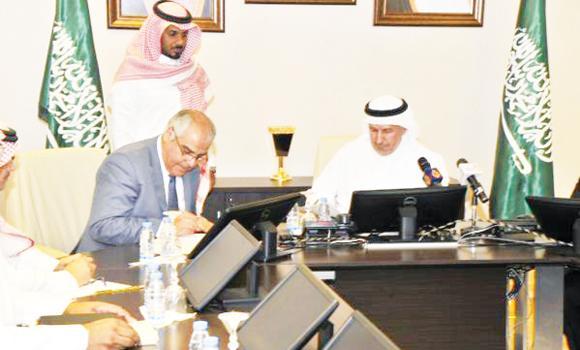
King Salman Center, UNICEF seal deal
The Riyadh-based King Salman Center for Relief and Humanitarian Works and UNICEF have signed a memorandum of understanding (MOU) to help Yemeni children who have taken refuge in Djibouti.
The MOU was inked between Dr. Abdullah bin Abdulaziz Al-Rabeeah, advisor at the Royal Court and supervisor general of the King Salman Center, and Ibrahim Al-Zeeg, UNICEF representative, in the presence of Djibouti Ambassador Ziauddin Saeed Bamakhrameh.
The center's spokesman, Raafat Al-Sabbagh, said it would support Yemeni refugees with $350,000 and urged world organizations and charities to cooperate with the center in providing relief to the needy Yemenis elsewhere.
The signing ceremony was held in the presence of a distinguished people who are actively involved in humanitarian projects to help the world's children.
The agreement comes within the keenness of the two institutions to promote cooperation and synergy between international organizations and social institutions to provide emergency relief to affected children in the world. The agreement contains the commitment of both parties to cooperate for the implementation of the joint venture to offer a helping hand to Yemeni children in Djibouti through improved access to adequate healthcare in a timely manner.
The project aims to ensure the full operation of the Regional Medical Center Obock by providing the necessary equipment, essential drugs and other medical supplies, and also attend to more complex cases, such as pregnant mothers undergoing caesarian sessions.
Al-Zeeq said it is a privilege for UNICEF to cooperate with the King Salman Center. "This agreement is in line with UNICEF's work on the exchange of international expertise and communicate with social institutions in the region."
According to the latest information released by UNHCR (April 16), 431 refugees (mainly from 158 families) have been registered by UNHCR and ONARS (the government’s refugee agency) as of April 15, 2015.
Information provided by UNHCR, indicates that 80 tents have already been erected and 10 latrines arranged. Meanwhile, the majority of refugees (405) are sheltered in two temporary transit centers managed by ONARS (Al Rahma orphanage, a private structure still under construction; and the city’s Sport Centre).
Upon arrival, they undergo a medical and nutritional check and are provided with access to food, water and WASH facilities. The remaining 26 refugees have either been placed in Holl Holl refugee camp or are in the capital Djibouti-city.
The MOU was inked between Dr. Abdullah bin Abdulaziz Al-Rabeeah, advisor at the Royal Court and supervisor general of the King Salman Center, and Ibrahim Al-Zeeg, UNICEF representative, in the presence of Djibouti Ambassador Ziauddin Saeed Bamakhrameh.
The center's spokesman, Raafat Al-Sabbagh, said it would support Yemeni refugees with $350,000 and urged world organizations and charities to cooperate with the center in providing relief to the needy Yemenis elsewhere.
The signing ceremony was held in the presence of a distinguished people who are actively involved in humanitarian projects to help the world's children.
The agreement comes within the keenness of the two institutions to promote cooperation and synergy between international organizations and social institutions to provide emergency relief to affected children in the world. The agreement contains the commitment of both parties to cooperate for the implementation of the joint venture to offer a helping hand to Yemeni children in Djibouti through improved access to adequate healthcare in a timely manner.
The project aims to ensure the full operation of the Regional Medical Center Obock by providing the necessary equipment, essential drugs and other medical supplies, and also attend to more complex cases, such as pregnant mothers undergoing caesarian sessions.
Al-Zeeq said it is a privilege for UNICEF to cooperate with the King Salman Center. "This agreement is in line with UNICEF's work on the exchange of international expertise and communicate with social institutions in the region."
According to the latest information released by UNHCR (April 16), 431 refugees (mainly from 158 families) have been registered by UNHCR and ONARS (the government’s refugee agency) as of April 15, 2015.
Information provided by UNHCR, indicates that 80 tents have already been erected and 10 latrines arranged. Meanwhile, the majority of refugees (405) are sheltered in two temporary transit centers managed by ONARS (Al Rahma orphanage, a private structure still under construction; and the city’s Sport Centre).
Upon arrival, they undergo a medical and nutritional check and are provided with access to food, water and WASH facilities. The remaining 26 refugees have either been placed in Holl Holl refugee camp or are in the capital Djibouti-city.
Share:
ADD TO EYE OF Riyadh
MOST POPULAR
Automechanika Riyadh to address need for future-proofing KSA’s automotive workforce
Sunday 27 April, 2025 10:03UniHawk’s Learning Lab blends education, exploration and experience to support career planning
Friday 25 April, 2025 12:57PIF's AviLease closes $1.5B revolving credit facility
Saturday 26 April, 2025 8:26Automechanika Riyadh 2025 officially opens tomorrow
Sunday 27 April, 2025 12:23 ×



























